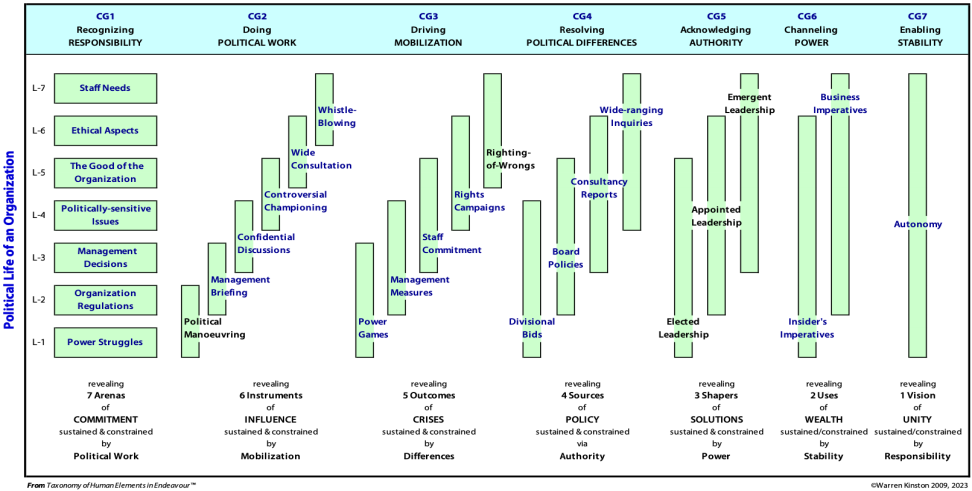Political Activities in Organizations
Face Up to Politics
The Framework for what determines was developed earlier in this Satellite. Now we must consider within organizations, and identify differences from similar phenomena within society.
In fulfilling their roles and performing their tasks, ambitious executives necessarily keep one eye firmly on matters like status, promotion and favouritism.
So never forget that the most restrained and outwardly unflappable people work within a sea of emotions and ambitions—their own and others. However strong the wish to deny , power-based activities are usually recognizable. The task here is to make this implicit awareness explicit to enable effective handling.
The diagram below reveals that almost every group needs re-considering and re-naming to suit organizational life.
certainly exist, and must be constrained.
and policies must put limits to authority, pressure, harassment, bullying and coercion.
are where accountability and the mélange of self-interests clash and get resolved one way or another.
emerge that are recognized as politically sensitive and distinct from straightforward management.
Chief executives and managers regularly exhort their staff in terms of the «» or the «» (on which all depend) i.e. .
must be considered; and of course:
People are still human beings with needs, but the community here refers to all staff, so we refer to e.g. for safety, for privacy, for friendly attitudes, for a clean environment.
occurs as expected, even if it is shaped by the culture, structures, policies and personalities in the organization.
replace .
seems more fitting than .
Instead of as found in society, organizations require to over-turn self-defeating arrangements or rules, and to enable innovation in management methods.
The equivalent of in organizations is , useful if not essential when profound changes are imminent.
The societal phenomenon of finds its counterpart in which is the form that takes.
replace a because the nature of authority in an organization means pressures and lobbying can usually be resisted. Games or ploys, however, test authority and manipulate or delay unwanted decisions.
replace and have similar implications.
replacesand is needed for any major change in strategy, culture or working practices.
replace Rights being defended may be those of female or handicapped employees, or relate to work-place prejudice based on things like skin-colour, ethnicity or disability.
remains, although that is perhaps as rare in organizations as elsewhere. It does occur following whistle-blowing and scandals. A new CEO may be required and, ideally, they decide to make amends and build a positive, humane working culture for all staff.
Powerful divisions or departments put in that are often sub-optimal in that they ignore the welfare of the organization as a whole; and budgets may be padded to counteract expected reductions.
The Board led by the CEO and top management team typically develops and sanctions . Such policy tends to ignore the needs of staff and ethical aspects that might harm profits or pursuit of the cause.
Policy is often generated by . However, consultancy firms have bested interests and services to sell—and their hammer may not correspond to the company's nail.
Rather rarely an organization may call for a , perhaps to reinvent itself. This would involve many inputs including all staff, customers and a variety of outside interests, including activist groups that may be hostile. Governing boards, like government, are often resistant to such efforts.
Organizations (unlike communities or societies) must grow and adapt to markets and societal forces—or fail. Leaders are given that responsibility.
are the central focus of organizations. From the CEO down the line-management spine of the organization, staff are appointed and expected (often implicitly) to handle political issues as part of their role.
are found in organizations, typically in relation to representative groups like staff unions or committees of professionals. Such leaders are also appointed members of staff and are at the mercy of the CEO. So often society provides laws to protect them.
arise when top management denies or suppresses popular discontent based on unacceptable practices, and there is insufficient legal protection for elected leaders to diffuse the situation. These are not the «champions» beloved of CEOs and management consultants alike. These champions signify a crisis of confidence in management.
may conflict with those that benefit a small group of .
A small insider group, typically led by the CEO, may be tempted to exploit the company, its staff and its shareholders, rather than be duty-bound to strengthen the firm.
Organizations are dynamic and focused with people entering and leaving all the time. Nevertheless remain essential to deliver results and make changes which have political dimensions.
Organizations are not «sovereign», but they do require to manage all aspects of internal politics and to be responsible for delivering on the mission.
Better viewing: Use browser zoom if needed.

Compare this with other applications of the framework:
Originally posted: August-2009; Last updated: 15-Nov-2010